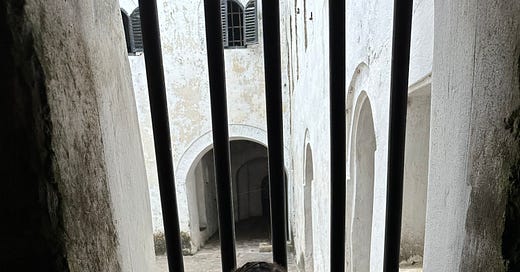It’s hard to put into words the profound impact of visiting the slave castles in Ghana. These structures, steeped in the dark history of the transatlantic slave trade, stand as stark reminders of a past filled with unimaginable suffering and cruelty. Walking through the narrow, damp corridors, it’s impossible not to feel the weight of the history that these walls carry.
The conditions in these castles were inhumane. Small, suffocating rooms where countless men, women, and children were packed together, often with barely enough space to move, let alone breathe. The air was thick with the stench of death and despair. These were not just holding cells—they were places of unimaginable torment where the cries of those imprisoned echoed endlessly.
The scale of the suffering is beyond comprehension. The sheer volume of people who passed through these castles, forcibly separated from their families and homelands, is staggering. Each step within those walls is a reminder of the millions of lives torn apart by the brutal machinery of the slave trade. These were people with hopes, dreams, and families—forever separated, their futures stolen.
As I stood there, I couldn’t help but think about how almost all Black people from Europe, North America, Central America, and South America have roots here. These castles are a painful but essential part of our history. They connect us to our ancestors, who endured the unimaginable, and remind us of the strength and resilience that courses through our veins.
Visiting these sites was a healthy reminder of what mankind is capable of—both the horrific depths of cruelty and the extraordinary capacity for resilience and survival. It’s a reminder that, while history can be dark, it’s crucial to remember it, to honor those who suffered, and to acknowledge the strength it took to overcome such profound adversity.
Remembering this history is not about dwelling on the past but about recognizing the endurance and courage of those who came before us. It’s about understanding the roots of our shared history and using that knowledge to build a future that honors their legacy. We must never forget the atrocities that took place within those walls, but we must also celebrate the strength and resilience that allowed our ancestors to survive and thrive despite everything.
In remembering, we acknowledge the pain, but we also recognize the power and possibility of overcoming. And in doing so, we pay tribute to the enduring spirit of our ancestors, who, despite everything, found ways to resist, survive, and eventually overcome.






So true.